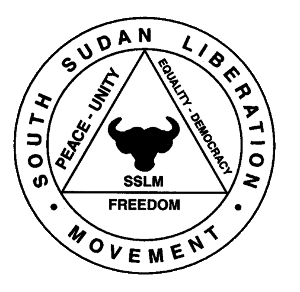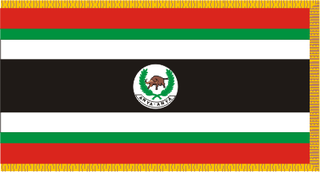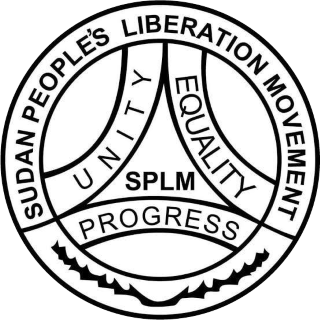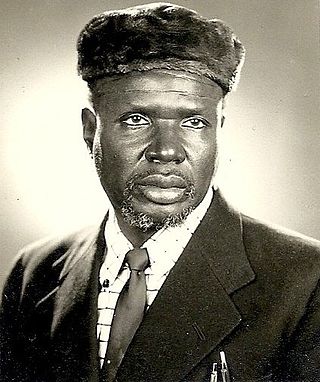Related Research Articles

Equatoria is the southernmost region of South Sudan, along the upper reaches of the White Nile and the border between South Sudan, Uganda, Kenya, and the Democratic Republic of the Congo. Juba, the national capital is the largest city in South Sudan, is located in Equatoria. Originally a province of Anglo-Egyptian Sudan, it also contained most of northern parts of present-day Uganda, including Lake Albert and West Nile. It was an idealistic effort to create a model state in the interior of Africa that never consisted of more than a handful of adventurers and soldiers in isolated outposts.

Ismail al-Azhari was a Sudanese nationalist and political figure. He served as the first Prime Minister of Sudan between 1954 and 1956, and as Head of State of Sudan from 1965 until he was overthrown by Gaafar Nimeiry in 1969.

The Addis Ababa Agreement, also known as the Addis Ababa Accord, was a set of compromises within a 1972 treaty that ended the First Sudanese Civil War (1955–1972) fighting in Sudan. The Addis Ababa accords were incorporated in the Constitution of Sudan.

Ibrahim Abboud was a Sudanese military officer and political figure who served as the head of state of Sudan between 1958 and 1964 and as President of Sudan in 1964; however, he soon resigned, ending Sudan's first period of military rule. A career soldier, Abboud served in World War II in Egypt and Iraq. In 1949, Abboud became the deputy Commander in Chief of the Sudanese military. Upon independence, Abboud became the Commander in Chief of the Military of Sudan.

Sadiq al-Mahdi, also known as Sadiq as-Siddiq, was a Sudanese political and religious figure who was Prime Minister of Sudan from 1966 to 1967 and again from 1986 to 1989. He was head of the National Umma Party and Imam of the Ansar, a Sufi order that pledges allegiance to Muhammad Ahmad (1844–1885), who claimed to be the Mahdi, the messianic saviour of Islam.

The South Sudan Liberation Movement (SSLM) is an armed group that operates in the Upper Nile Region of South Sudan. The group's creation was announced in November 1999 by people of the Nuer ethnicity who were in both the rebel Sudan People's Liberation Army (SPLA) and the government-allied South Sudan Defence Forces (SSDF) gathered in Waat. The SSLM was declared to be unaligned in the Second Sudanese Civil War, then entering its sixteenth year. The name "South Sudan Liberation Movement" was decided upon the next year, borrowing from the earlier Southern Sudan Liberation Movement, which existed in the 1980s.

The Anyanya were a southern Sudanese separatist rebel army formed during the First Sudanese Civil War (1955–1972). A separate movement that rose during the Second Sudanese Civil War were, in turn, called Anyanya II. Anyanya means "snake venom" in the Ma'di language.

The Sudan People's Liberation Movement is a political party in South Sudan. It was initially founded as the political wing of the Sudan People's Liberation Army in 1983. On January 9, 2005 the SPLA, the SPLM and the Government of Sudan signed the Comprehensive Peace Agreement, ending the civil war. SPLM then obtained representation in the Government of Sudan, and was the main constituent of the Government of the then semi-autonomous Southern Sudan. When South Sudan became a sovereign state on 9 July 2011, SPLM became the ruling party of the new republic. SPLM branches in Sudan separated themselves from SPLM, forming the Sudan People's Liberation Movement–North. Further factionalism appeared as a result of the 2013–2014 South Sudanese Civil War, with President Salva Kiir leading the SPLM-Juba and former Vice President Riek Machar leading the Sudan People's Liberation Movement-in-Opposition.

On 25 May 1969, several young officers calling themselves the Free Officers Movement seized power in Sudan in a coup d'état and started the Nimeiry era, also called the May Regime, in the history of Sudan. At the conspiracy's core were nine officers led by Colonel Gaafar Nimeiry, who had been implicated in plots against the Abboud regime. Nimeiry's coup preempted plots by other groups, most of which involved army factions supported by the Sudanese Communist Party (SCP), Arab nationalists, or conservative religious groups. He justified the coup on the grounds that civilian politicians had paralyzed the decision-making process, had failed to deal with the country's economic and regional problems, and had left Sudan without a permanent constitution.
The Sudan African National Union is a political party formed in 1963 by Saturnino Ohure and William Deng Nhial in Uganda. In the late 1960s, the party contested elections in Sudan seeking autonomy for southern Sudan within a federal structure. The exile branch of the party meanwhile supported full independence. A party with this name was represented in the Southern Sudan legislature in 2008.
Samuel Aru Bol was a prominent politician in Southern Sudan. During the Second Sudanese Civil War (1983-2005) he signed the Khartoum Peace Agreement of 1997 as representative for the Union of Sudan African Parties (USAP).
William Deng Nhial was the political leader of the Sudan African National Union (SANU), from 1962 to 1968. He was elected unopposed. He was one of founders of the military wing of the Anyanya fighting for the independence of southern Sudan. He was ambushed and killed by Sudanese Armed Forces (SAF) on 9 May 1968 at Cueibet, on his way from Rumbek to Tonj. The Sudanese government denied having authorised his assassination. Although no investigation was conducted, eyewitnesses at Cueibet village and an SANU investigation committee confirmed the SAF's part in his death.
Saturnino Ohure Hilangi, or Saturnino Lohure was a Roman Catholic priest and a politician who played an important role in the early movement for secession of South Sudan.
The Liberal Party, at first called the Southern Party and later the Southern Liberal Party, was formed in Anglo-Egyptian Sudan before Sudan became independent in January 1956. Until the military coup of November 1958 the Liberals were one of the main parties representing the southern Sudanese constituencies in parliament.
Stanislaus Paysama was one of the founders of the Liberal Party in Anglo-Egyptian Sudan a few years before Sudan gained independence in 1956.
Both Diu or Böth Diew was a politician who was one of the leaders of the Liberal Party in Sudan in the years before and after independence in 1956. His party represented the interests of the southerners. Although in favor of a federal system under which the south would have its own laws and administration, Both Diu was not in favor of southern secession. As positions hardened during the drawn-out First Sudanese Civil War (1955–1972) his compromise position was increasingly discredited.
The Southern Sudan Federal Party was a short-lived political party in Sudan, formed in 1957. It was successful in the 1958 parliamentary elections, but left parliament when it was clear that its federalist constitutional proposals would be rejected, and shortly afterwards broke up.
Aggrey Jaden Ladu was a South Sudanese politician.

The Azania Liberation Front (ALF) was an armed rebel faction established in 1965, during the First Sudanese Civil War, by exiled members of the Sudan African National Union (SANU). It was a part of the original South Sudan Liberation Movement, the first Sudanese secessionist movement. Its name was taken from the Greek Azania, the Greek designation for the lands of East Africa south of Nubia.

Gordon Muortat Mayen Maborjok (1922–2008) was a Sudanese revolutionary and politician and advocate for Southern Sudan's independence. He was the President of the Nile Provisional Government (NPG) which led the Anyanya during the First Sudanese Civil War. Muortat also served as Vice-President of the Southern Front (SF) and Foreign Minister in the Southern Sudan Provisional Government (SSPG).
References
- ↑ Nyuot Yoh 2005, pp. 16.
- ↑ Nyuot Yoh 2005, pp. 16–17.
- ↑ Veenhoven & Ewing 1977, pp. 243.
- 1 2 Harir, Tvedt & Badal 1994, pp. 105.
- ↑ Nyuot Yoh 2005, pp. 18.
- ↑ Collins 2006, pp. 82.
- ↑ Nyuot Yoh 2005, pp. 34.
- ↑ Nyuot Yoh 2005, pp. 35.
- ↑ Nyuot Yoh 2005, pp. 23.
- ↑ Collins 1991, pp. 188.
- ↑ Burr & Collins 1995, pp. 7.
- ↑ Shinn, Ofcansky & Prouty 2004, pp. 7.
- ↑ Woodward 2003, pp. 45.
Sources
- Burr, Millard; Collins, Robert O. (1995). Requiem for the Sudan: war, drought, and disaster relief on the Nile. Westview Press. ISBN 0-8133-2121-2.
- Collins, Robert O. (1991). Eastern African history. Markus Wiener Publishers. ISBN 1-55876-016-4.
- Collins, Robert O. (2006). The southern Sudan in historical perspective. Transaction Publishers. ISBN 1-4128-0585-6.
- Harir, Sharif; Tvedt, Terje; Badal, Raphael K. (1994). Short-cut to decay: the case of the Sudan. Nordic Africa Institute. ISBN 91-7106-346-3.
- Nyuot Yoh, John G. (19 July – 28 August 2005). "Notes on Foreign Policy Trends of Southern Sudan Political and Military Organizations and Parites (1940s-1972)" (PDF). Archived from the original (PDF) on 30 March 2012. Retrieved 2011-08-20.
- Shinn, David Hamilton; Ofcansky, Thomas P.; Prouty, Chris (2004). Historical dictionary of Ethiopia. Scarecrow Press. ISBN 0-8108-4910-0.
- Veenhoven, Willem Adriaan; Ewing, Winifred Crum (1977). Case studies on human rights and fundamental freedoms: a world survey, Volume 4. Martinus Nijhoff Publishers. ISBN 90-247-1956-9.
- Woodward, Peter (2003). The Horn of Africa: politics and international relations. I.B.Tauris. ISBN 1-86064-870-3.